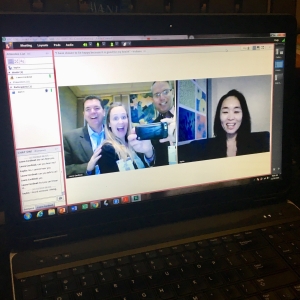Integrating Military and Civilian Cultures in the MSW Classroom through Interprofessional Approaches
November 29, 2018- Practice
An interprofessional approach to military social work education could help facilitate reintegration and build understanding between civilian and military-affiliated students.
Civilian social work students often share a classroom with their military-affiliated peers, but the majority do not fully understand the unique factors that may shape the perspectives of service members, veterans and their families. What’s more, many of these students express an interest in pursuing a career that helps service members or veterans, but have little experience working with these populations directly when they enter the MSW program. As such, students may be underprepared to serve the military community in their work, or even to effectively engage with their military peers in the classroom.
In the hopes of developing new strategies for expanding military education in social work, USC Suzanne Dworak-Peck School of Social Work Clinical Assistant Professor of Field Education Laura Cardinal partnered with Clinical Assistant Professor Steven Bush, who has a background in both social work and education, Clinical Assistant Professor and veteran David Bringhurst, and USC graduate and current Army logician Kaylin Song, MSW ‘17.
Together, the four co-hosted an interactive workshop at the Annual Program Meeting for the Council on Social Work Education (CSWE) on Nov. 10, which focused on promoting mutual understanding between civilians and military affiliates in the MSW classroom through an interprofessional approach to education.
An interprofessional approach to military social work education
With four brief presentations followed by an open Q&A session on the benefits of interprofessionalism for faculty and students, Cardinal and her colleagues centered their workshop on addressing the lack of understanding that often exists between civilians and their military-affiliated peers in the classroom. Specifically, they focused on the virtual field practicum course—an integral component of social work education for students of the school’s Virtual Academic Center, for which Cardinal is the lead instructor.
According to Cardinal, the virtual course has provided an ideal forum to showcase the benefits of an interprofessional approach to military social work education. For 12 weeks as part of their virtual field placement, MSW students work in hour-long weekly sessions with a trained actor who plays the role of a recently separated military veteran. “He stays in character the entire time, providing students with a highly believable representation of what a typical veteran’s life might be like,” Cardinal said.
For civilian students, the experience, while challenging, can provide them with a more comprehensive understanding of the experiences of service members, serving as a strong foundation upon which to pursue a career in military social work. “This field work also creates a supportive environment in which they can explore their own professional goals, learn from their mistakes and ask questions about how to effectively provide for the needs of service members and veterans,” Cardinal said.
Bridging the gap between civilian and military-affiliated students
For military-affiliated students, the practicum gives them the space to better process their own experiences and integrate their academic duties with their obligations as service members, veterans or military family members. It also encourages both civilian and military students to explore the strengths associated with a collectivistic culture—one which characterizes both military service and social work practice—and discuss how this cultural understanding can be used as a strength in the civilian world.
Ultimately, Cardinal and her co-hosts designed this workshop with the aim of introducing attendees to a more effective alternative to current military social work training, as well as providing a broader perspective on how interprofessional education can help to increase understanding between civilians and military affiliates.
“We don’t intend for every participant in the workshop to walk away committed to the use of trained actors in the classroom,” Cardinal said. “Rather, we hope that every participant will feel empowered to explore unique ways to deepen civilian and military connections both in and outside of the classroom.”
To reference the work of our faculty online, we ask that you directly quote their work where possible and attribute it to "FACULTY NAME, a professor in the USC Suzanne Dworak-Peck School of Social Work” (LINK: https://dworakpeck.usc.edu)
